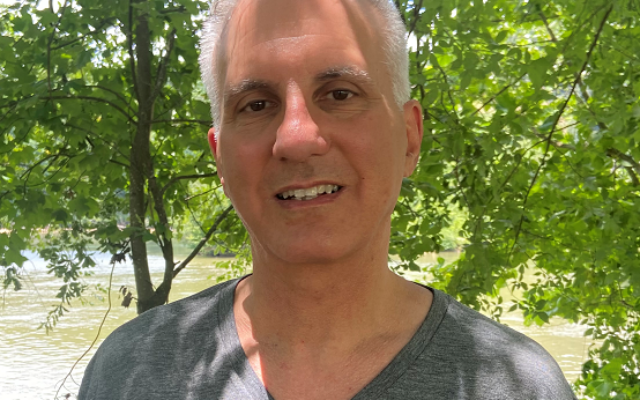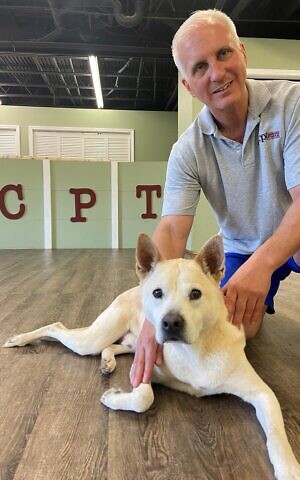Pet Trainer Spivak Sets Up Success
Mark Spivak helps owners deal with tough issues like animal PTSD.
After 37 years with the Atlanta Journal-Constitution and now with the AJT, , Jaffe’s focus is lifestyle, art, dining, fashion, and community events with emphasis on Jewish movers and shakers.

You might recognize Brooklyn-born Mark Spivak’s work from his credits working with PBS’s “Nova” series and various television news programs where he shared expert insight. He has co-authored 17 peer-viewed studies in the field of canine neuroscience. Some of his projects were with the world-renowned Emory Canine Cognitive Laboratory. He has participated in or supervised the training of more than 50,000 client dogs and over 100 client cats.
Locally, Spivak serves as head trainer for Comprehensive Pet Therapy where he helps owners tackle tough issues like PTSD. Spivak noted, “The difference between the average dog trainer and an elite behaviorist is the mastery of art and science. There’s an art to communicating with dogs and their humans…and from the scientific perspective, knowledge of canine and behavioral psychology is mandatory for achieving optimal outcomes, especially in complex behavior cases.”
Spivak was originally destined for a career in finance with his Bachelor of Science in economics from Wharton School of Finance and an MBA from the University of California Berkeley. He recalled, “I was too iconoclastic for the corporate world and realized I enjoyed training dogs more than office work. Now because of demand, I am hiring more trainers and looking for other locations in addition to Atlanta and Eugene, Ore.”
Spivak’s own pets have excelled: his German shepherd, Topper, was a regional champion and national competitor in “schutzhund,” a dog sport combining tracking, obedience, and protection. He also achieved advanced tracking titles and competed in the KNPV nationals — a working dog sport associated with police dogs. Spivak’s other shepherd, Akbar, was trained in tracking, protection, and agility; performed in commercials and movies; and was a certified therapy dog that frequently visited the Weinstein Center. His cat, Simba, learned several obedience commands, played hide and seek, and enjoyed playing with dogs. CPT’s Service Dog Program has been featured in the New York Times best-selling book, “Doctor Dogs,” and in People magazine.
Interestingly, Spivak has been an expert witness in national civil and criminal cases involving canine behavior and training. Civil cases may include dog bite injuries, contract issues, custody resolutions, HOA disputes, and ADA violations. Criminal cases include motions to suppress (usually evidence obtained from police K9 searches), felony cruelty to animals, and animal control violations — and even included a murder case!

Spivak shared his insight into several topics:
AJT: Are cats trainable?
MS: Our business is 99 percent dog training and only 1 percent cat. We would love to expand our cat clients, while resolving feline behavioral problems, including litter box issues, destructive scratching, socialization issues, cat-human aggression, cat-cat aggression, and anxiety. Cats can learn basic obedience commands — and often enjoy learning if training is introduced during the kitten stage.”
AJT: Which are smarter — cats or dogs?
MS: From an intellectual standpoint, dogs and cats are similar, but highly dissimilar in motivation. Dogs are superior interpreters of human physical and vocal communication, more easily inspired by praise, food, and play, and more cooperative.
AJT: What to look for in adopting?
MS: A confident, secure, cooperative, appropriately social pet is far more satisfying than an anxious, stubborn, or aloof pet. We advise prospective owners to steer away from young or adult dogs or cats exhibiting anxious temperaments or that have a history of aggressive or destructive behavior. Confident animals typically become more enjoyable companions.
AJT: What about pets dealing with anxiety?
MS: The majority of anxiety cases occur amidst fellow dogs or cats, people, noises, thunderstorms, fireworks, loud vehicles, and unfamiliar objects. Some unusual cases involved dogs afraid of light penetrating through blinds, leash attachment, and humans touching certain parts of the body. When treating generalized anxiety disorder, we typically recommend a variety of holistic, homeopathic, quality of life, and nutritional solutions — and sometimes ask the client to speak to a veterinarian about anxiolytic medication.”
AJT: Any suggestions regarding administering drugs to pets?
MS: The optimal homeopathic solution depends upon the animal and issue. We don’t recommend cannabis (illegal in Georgia) but often recommend cannabidiol, or CBD, which can be a useful adjunct when treating anxious behavior in a dog or cat.
The bottom line, according to Spivak, is that problems can often occur by people progressing too quickly. When it comes to systematic desensitization, the mantra, “slow and steady wins the race,” is apropos.
CPT offers a variety of services, including group class, private instruction, in-home private instruction, remote (public access) private instruction, virtual private instruction, and board training. Programs cover basic on and off-leash obedience, competition obedience, agility, housebreaking, manners, and behavior modification. For more info, call 404-236-2150.
- Pets
- Community
- Marcia Caller Jaffe
- Mark Spivak
- PBS
- Nova
- Emory Canine Cognitive Laboratory
- Comprehensive Pet Therapy
- PTSD
- dog trainer
- Wharton School of Finance
- University of California Berkeley
- German shepherd
- schutzhund
- Weinstein Center
- litter box issues
- destructive scratching
- socialization
- cat-human aggression
- cat-cat aggression
- Anxiety
- off-leash obedience
- competition obedience
- agility
- housebreaking
- Manners
- behavior modification



comments